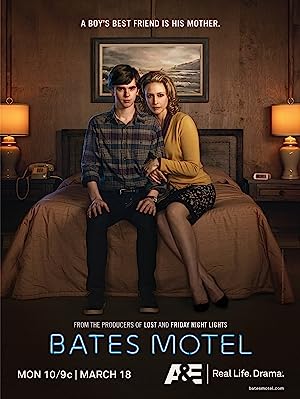David Lynch called–he wants his wholesome town with evil lurking beneath the surface back. Thank God that they’re not inexplicably quirky, just damaged because I can work with that. I hate prequels that try to explain evil such as the remake of Halloween or pretend that it is shocking that evil appears in the most idyllic places. Someone pay Truman Capote’s heirs. Bates Motel felt extremely contrived as if they went through a checklist, “See! This is why Norman is crazy.” The problem with having so many unreliable characters is that a viewer will end up questioning whether anything is actually happening. For example, I was convinced that Norman’s first love interest was actually dead or if anything even happened. Why is everyone attracted to Norman? In Stoker, I didn’t have a problem with the aberrant characters’ period dress because it was a symbol of their mental dissonance, but the entire show is plagued with it. It is stylish and an attractive homage to Hitchcock, but doesn’t quite work when it dominates today’s setting. The show gets very strong after episode 6 when they mostly wrap up an exploitive story line that does nothing but exploit a serious endemic problem and use one ethnic character as a story device instead of a complete person (another major problem with the show) and delve into the characters instead of what is happening to them. What made me watch the entire show: the cast’s acting is phenomenal. Every scene with Vera Farmiga and Nestor Carbonell is pitch perfect. A countercultural reading is that the Bates’ family is being cast as once impotent vigilantes fighting every perceived wrong in a corrupt, cruel world bent on taking away their ability to survive. With better writers and fewer cliches about the inevitable cycle of abuse, Bates Motel could really crack with excitement.

Bates Motel
Stay In The Know
Join my mailing list to get updates about recent reviews, upcoming speaking engagements, and film news.




